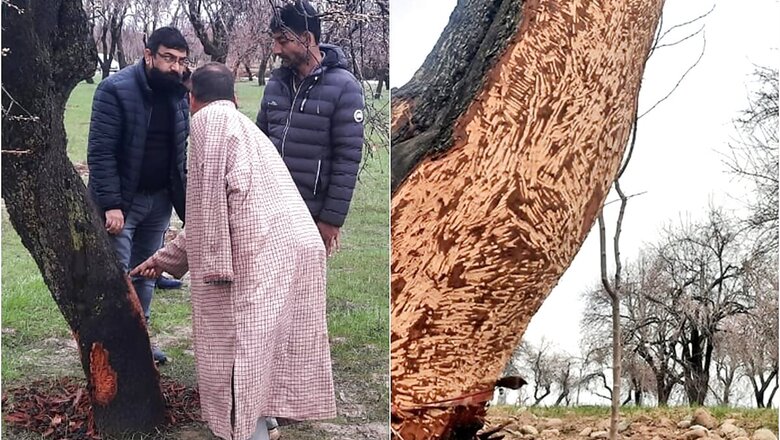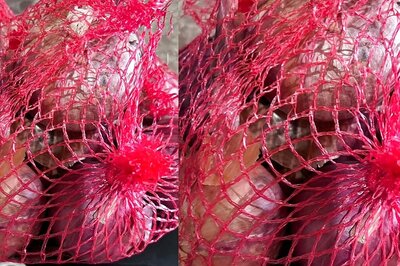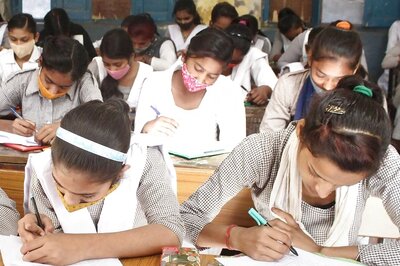
views
Fruit growers in militancy-hit south Kashmir are facing a fresh wave of terror: big, thorny rodents that peel the bark of fruit trees and render them dead.
With sharp and pointed spikes on their bodies, the porcupines have unleashed fear among almond and apple growers in the plateaus of Pulwama, Shopian and Budgam, damaging hundreds of trees beyond repair.
“Ten almond trees in my orchard have been rendered useless. Trees that had taken 20 years to grow to full size will decay now,” Ghulam Nabi, a villager from Rohmu, told News18.
Disappointed, Nabi said many of his neighbours have reported similar losses to the horticulture department.
After News18 flagged the issue, horticulture department director Ajaz Ahmad Bhat sent officials to the affected areas on Monday. The teams advised farmers to protect the bark by putting wire mesh around the stumps and lace them with pepper spray. Bhat also wrote to the wildlife department, seeking help to combat the invasive creatures.
Haji Ahsan Khan, one of those affected, said 50 trees in his orchard have suffered damages. “The bark of the trees has been shredded from the base of the stump to even branches. The trees cannot be brought back to life. It is a carnage,” he said.
Nabi said depending upon the size and flowering, each tree in his orchard bears 20 to 40kg of almonds, and he stands to lose Rs 60,000 this season.
“The loss is actually grave, given that a farmer invests time and emotions to nurture a tree. It will take at least 15 years to grow a tree of such size. Even a hybrid tree will take at least 10 years to bear fruit,” he said, sounding dejected.
Farmers said it was not clear whether the animal eats or only scratches the bark of the trees, pointing out they have noted that the damage is widespread — almost every other grower is counting losses. Once the outer layer is torn, a tree cannot be brought back to life. “Even the experts surrender to this menace,” Nabu said.
Though no census has been done for the exact losses, hundreds of trees have suffered girdling in the orchards of Newa, Rohmu, Tujan, Kamrazipora, Goosu, Frasipora, Chewa Kalan and Quil villages.
Weary farmers who slog in the fields throughout the year said they had no idea whether these creatures come for the bark or its sap. But looking at the spread of the damage, they were certain their numbers must be in thousands.
The farmers noticed the barks were chipped from mid-February, soon after the snow melted in the plateaus. “The porcupines became very aggressive and would damage 10-15 trees every night,” said Bashir Ahmad, a farmer from Tujan. “First they targeted the almond trees and now they are targeting apples.”
Admitting that the issue is grave, Mukesh Sharma, chief horticulture officer, Pulwama, said he advised the farmers to cover the stump with jute bags or a wire mesh. “We have also sought help from wildlife department,” he added.
His superior Bhat, director of the horticulture department, told News18 earlier that he has asked his staff to pass on instructions to farmers on how to check the menace. “Wrapping the tree trunks with many layers of jute bags will greatly help. Besides we are seeking guidance from wildlife department,” he added.
Suhail Intisar, senior wildlife warden for the Pulwama-Shopian range, said wildlife teams will try some artificial as well as natural repellents to keep the creatures away. “We will grow Iris which works as a repellent, but since they are in thousands and spread in a vast area, it will take time to address the issue,” he said.
Intisar hoped porcupines will stop devouring the trees once tubers and bulbs become available in plains from April. “The porcupines thrive in dry karevas than in moist plains. They live in burrows and breed very fast. Once there is shortage of tubers in soil, they gorge on trees,” he said.
From next month, the porcupines would have enough food and they would stop visiting the orchards, he added.
In the meantime, wildlife teams will use traps to check the menace.
“The porcupines find the bark of the trees tasty. Due to heavy snow and scarcity of food this winter, they have devoured the tree skins and caused irreparable damage to farmers,” he said. “But things will change from April.”
The last two seasons (due to restrictions after the abrogation of Article 370 and then the Covid lockdown) have been rather difficult for Kashmiri farmers who have struggled to fetch decent prices for their produce. Last year, farmers were rocked by the 40 per cent loss in apple production due to scab disease.
Read all the Latest News, Breaking News and Coronavirus News here




















Comments
0 comment